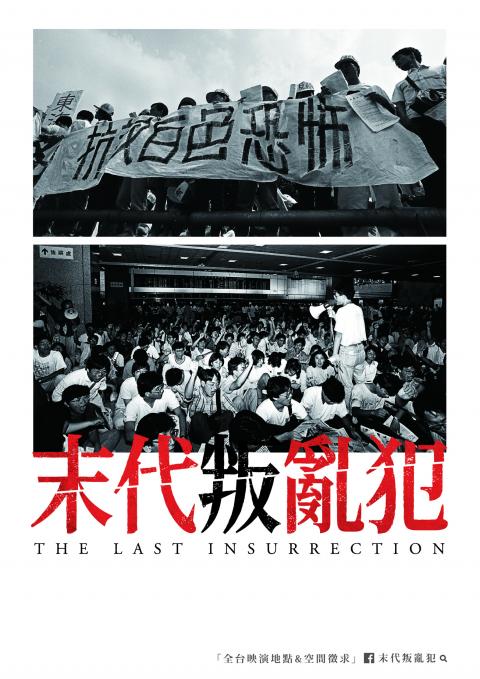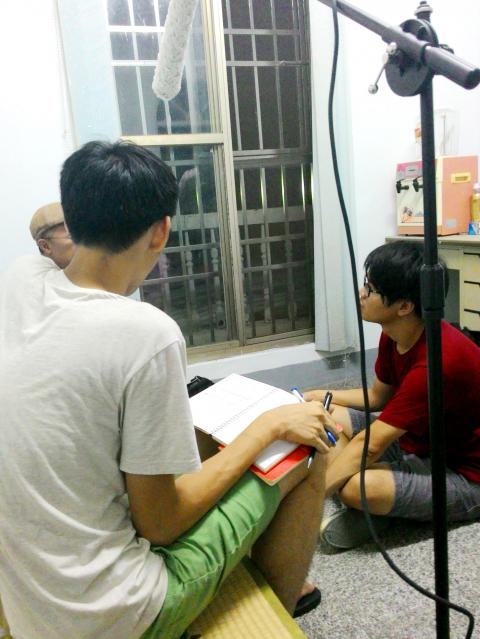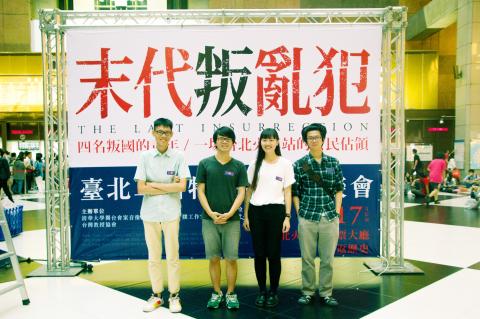Liao Chien-hua’s (廖建華) knowledge of Taiwan’s political past used to be limited to a bunch of dates. It wasn’t until friends and schoolmates from National Tsing Hua University (NTHU) took part in the anti-media monopoly protests in 2012 that the chemical engineering major started to read about Taiwan’s history.
“For many young people, including myself, the anti-media monopoly movement opened up a window to a different world,” Liao, who was born in 1990, says.
Liao soon read the Oral History of Su Beng (史明口述史). Su Beng (史明), 96, is a veteran Taiwan independence leader and founder of the Taiwan Independence Association (TIA, 獨立台灣會). Liao was shocked to learn that in 1991, four years after martial law was lifted, Investigation Bureau agents broke into then-NTHU student Liao Wei-chen’s (廖偉程) dorm room, arrested him and charged him with sedition.

Photo Courtesy of The Last Insurrection crew
Known as the Taiwan Independent Association incident (TIA, 獨台會案), Liao Wei-chen was one of four individuals accused of organizing pro-independence activities under Su’s guidance. If found guilty, they would face the death penalty under the Punishment of Rebellion Act (懲治叛亂條例).
The arrests triggered a student and activist occupation of the Taipei Railway Station. A few days later, the legislature abolished the Punishment of Rebellion Act, and the four were immediately freed.
Liao Chien-hua, who had never heard of the incident, was intrigued. In 2013, he started a documentary project on the incident with three NTHU friends, all born after 1990. Two years later, having interviewed 46 victims, activists and officials, the film, The Last Insurrection (末代叛亂犯), is nothing like what they had planned it to be.

Photo Courtesy of The Last Insurrection crew
The filmmakers originally intended to focus on Liao Wei-chen because he was the subject of most of the information they found.
“But then, we learned that there were a lot more things we didn’t know,” Liao Chien-hua said. “There was virtually no mention of the other people who got arrested ... It raises a problem: in official history, there is no room for the socially disadvantaged.”
REDISCOVERING HISTORY

Photo Courtesy of The Last Insurrection crew
The other three arrested were Aboriginal rights activist Masao Nikar, political activist Wang Hsiu-hui (王秀惠) and cultural historian Chen Cheng-jen (陳正然). None of the four knew each other. The only link was that they studied Su’s 1962 book Modern History of Taiwanese in 400 Years (台灣人四百年史) and some had visited Su, who was then living as a political refugee in Tokyo.
Fu Jen Catholic University professor Ho Tung-hung (何東洪), who participated in the Wild Lily Student Movement (野百合學運) in 1990 when he was a student, says it was a frightening time.
“Everybody was scared ... All of a sudden, the White Terror became so real. It was not something in the past or imagined,” Ho said at a forum after a screening of the documentary organized by the Green Party Taiwan earlier this month.
Back then, Su’s book was banned, but “everybody had a copy of it,” Ho added, recalling a newsstand during his days at National Central University that sold “everything that was banned,” — from dangwai (黨外, or non-Chinese Nationalist Party) publications to pornography.
THE OMISSION
The Last Insurrection features commentaries about the incident from many instantly-recognizable faces such as Cheng Li-chun (鄭麗君), Lin Chia-lung (林佳龍) and Chen Shih-meng (陳師孟). But there are also a few who have remained largely unknown.
Masao, an Amis who became an Aboriginal rights activist, works as a pastor in Hualien. In the documentary, he says that Aboriginals think that Taiwan’s history spans thousands, not hundreds, of years.
The filmmakers discovered that Wang, who died a few years after the incident, was born and raised in poverty, and was a single mother who worked odd jobs to support her family. She was a member of the Democratic Progressive Party (DPP) as well as the Formosa Political Care Foundation North Branch (台灣民主運動北區政治受難基金會, FPCF), an organization set up in 1987 by dangkung (黨工), which refers to people who carry out political activities at the grassroots level — laborers and small business owners, for example, that were “looked down on and discredited by the Chinese Nationalist Party (KMT) regime as the slipper-wearing, betel nut-chewing, Taiwanese-speaking boors,” Ho says.
Liao Chien-hua says that FPCF was like a self-help group for dangkung. Back then, many were injured and arrested during street protests and clashes with the police. They were often the breadwinners of their families. But they mostly went unnoticed, Liao says.
In the film, Wang’s close friend Chuang Shu-hui (莊淑惠), a former dangkung, laments that no one knew or cared when Wang died. Tsao Ai–lan (曹愛蘭), then-vice president of the Taiwan Association for Human Rights (台灣人權促進會) who became a friend of Wang’s, discusses the sexual discrimination facing female activists of that time.
She says many saw Wang as a butterfly who “sold her sexiness” because she dressed in a feminine way.
“Male politicians didn’t want us to befriend their wives because they thought we were a bad influence,” Tsao adds.
Liao Wei-chen says it is remarkable to see how the young filmmakers have formed their own opinions.
“I really like the way they choose to approach the incident. Past documentaries always focus on students: ‘Look, it is students occupying the train station.’ It’s as if there is something very noble about students who protest,” he says.
“It is like the Sunflower movement. There are many social forces behind it, but it is still labeled as a student movement,” he adds.
FILLING A VOID
Since last month, The Last Insurrection has been screened at venues across the country, ranging from colleges and universities, libraries to independent bookstores, small cafes, restaurants and bars. Most viewers are in their twenties, and may not have any idea about many of the events, names, ideas and terms mentioned in the film, according to Liao Chien-hua.
But he says that it’s a good start by writing “Masao Nikar and Wang Hsiu-hui back into history.”
Liao Chien-hua says he will continue to make documentaries about lesser-known historical events during Taiwan’s democracy movement in the late 80s and early 90s, through the eyes of participants or those who lived through it.
“I think we have come to know that our understanding of history is easily shaped by official ideology. What interests me more now is what people of different genders, ethnicities and classes have to say,” he says.
For more information about the documentary, visit www.facebook.com/fromInsurrectiontoInnocency

On April 26, The Lancet published a letter from two doctors at Taichung-based China Medical University Hospital (CMUH) warning that “Taiwan’s Health Care System is on the Brink of Collapse.” The authors said that “Years of policy inaction and mismanagement of resources have led to the National Health Insurance system operating under unsustainable conditions.” The pushback was immediate. Errors in the paper were quickly identified and publicized, to discredit the authors (the hospital apologized). CNA reported that CMUH said the letter described Taiwan in 2021 as having 62 nurses per 10,000 people, when the correct number was 78 nurses per 10,000

As we live longer, our risk of cognitive impairment is increasing. How can we delay the onset of symptoms? Do we have to give up every indulgence or can small changes make a difference? We asked neurologists for tips on how to keep our brains healthy for life. TAKE CARE OF YOUR HEALTH “All of the sensible things that apply to bodily health apply to brain health,” says Suzanne O’Sullivan, a consultant in neurology at the National Hospital for Neurology and Neurosurgery in London, and the author of The Age of Diagnosis. “When you’re 20, you can get away with absolute

May 5 to May 11 What started out as friction between Taiwanese students at Taichung First High School and a Japanese head cook escalated dramatically over the first two weeks of May 1927. It began on April 30 when the cook’s wife knew that lotus starch used in that night’s dinner had rat feces in it, but failed to inform staff until the meal was already prepared. The students believed that her silence was intentional, and filed a complaint. The school’s Japanese administrators sided with the cook’s family, dismissing the students as troublemakers and clamping down on their freedoms — with

As Donald Trump’s executive order in March led to the shuttering of Voice of America (VOA) — the global broadcaster whose roots date back to the fight against Nazi propaganda — he quickly attracted support from figures not used to aligning themselves with any US administration. Trump had ordered the US Agency for Global Media, the federal agency that funds VOA and other groups promoting independent journalism overseas, to be “eliminated to the maximum extent consistent with applicable law.” The decision suddenly halted programming in 49 languages to more than 425 million people. In Moscow, Margarita Simonyan, the hardline editor-in-chief of the